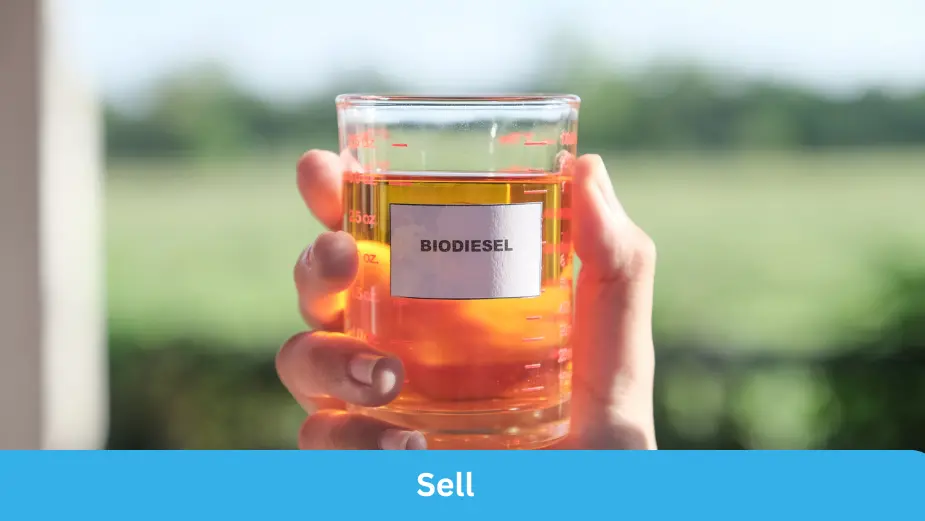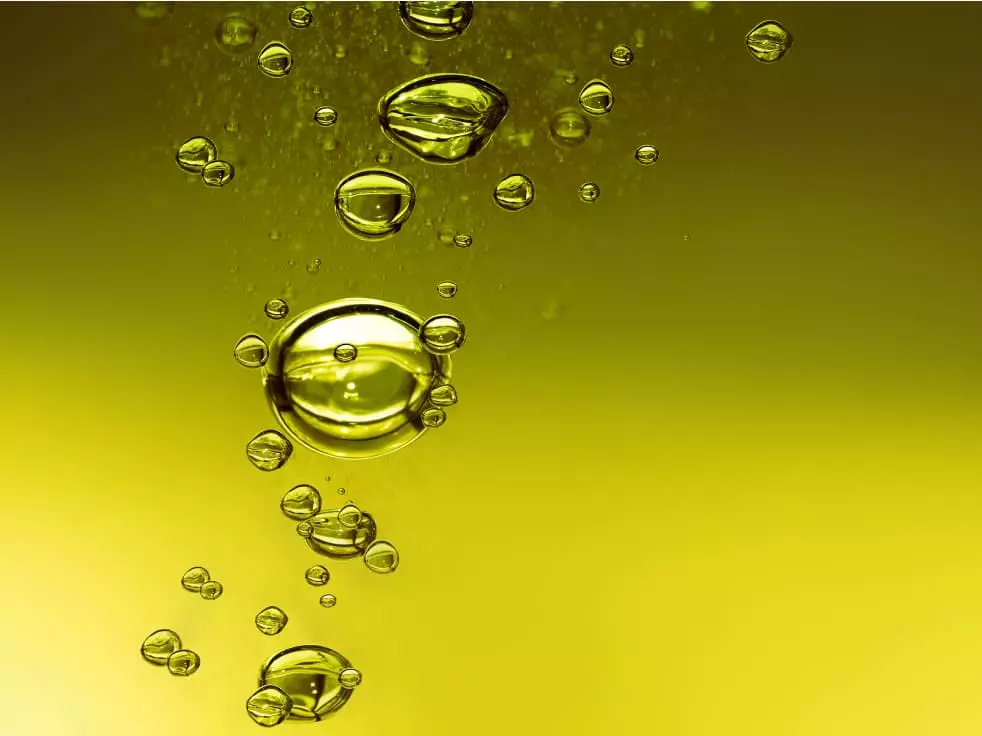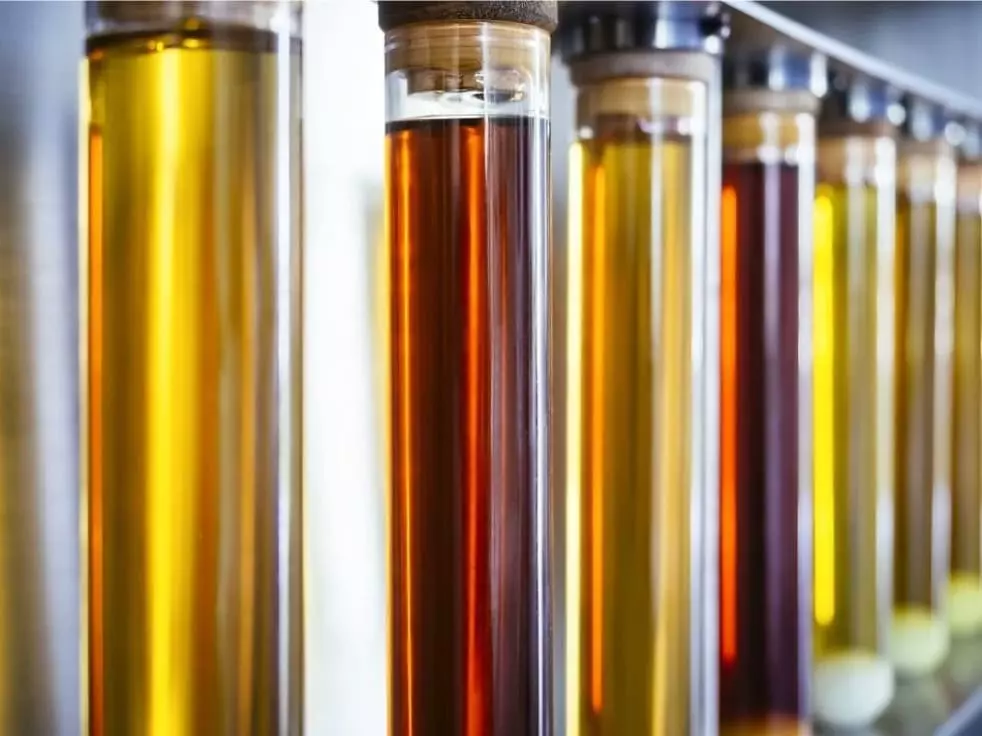Biodiesel
Discover a greener alternative to traditional diesel – Biodiesel. Crafted from eco-friendly sources like fresh and recycled vegetable oils, animal fats, and acid oils, it’s a liquid fuel that offers a cleaner-burning option compared to regular diesel. Biodiesel is your low-risk, low-cost solution for reducing CO2 emissions and other pollutants. Make the sustainable switch today!

Gross Calorific Value
9000 ~ 10000 kcal/kg

Specific Gravity
0.86 ~ 0.88

Viscosity
3 ~ 5 cSt
Discover Latest Trade Updates

Biodiesel
Nashik, Maharashtra

Biodiesel
1,000 – 1,500 KL
Hisar, Haryana

Biodiesel
Uttar Pradesh
Biodiesel Blending Ratio and Capacity


Biodiesel Production Process

Biodiesel Market

Biodiesel Advantages

Safe and easy-to-use

Superior Lubricity

Better Engine Performance

Longer Engine life
Frequently Asked Questions
Is Biodiesel Illegal in India?
Where is biodiesel used in India?
Who is the largest producer of biodiesel in India?
What is the cost of 1 Liter biodiesel?
Where to find biodiesel suppliers in india?
Buyofuel is India’s top online platform connecting you with biodiesel suppliers. Need biodiesel? Reach out to us to connect with reliable suppliers you can trust.
Can we sell bio biodiesel in India?
Yes, biodiesel can be sold in India. The country has regulations and standards in place for biodiesel production and sale, and companies that meet these requirements can legally sell biodiesel in the Indian market.
Why is biodiesel not widely used in India?
Biodiesel is not widely accessible in India due to a shortage of feedstock and an unorganized supply chain for raw material procurement.
What are the benefits of using biodiesel?
How is biodiesel produced?
Biodiesel is produced through a process called transesterification. In this process, vegetable oils or animal fats are combined with an alcohol, typically methanol or ethanol, in the presence of a catalyst, such as sodium hydroxide or potassium hydroxide. This reaction breaks down the oils or fats into biodiesel (methyl esters) and glycerin. The biodiesel is then separated from the glycerin and purified to meet fuel standards before being used as a renewable and environmentally friendly alternative to diesel fuel.
What is the target of biodiesel blending in India?
Is Biodiesel Illegal in India?
No, biodiesel isn’t illegal in India. The government actively promotes biodiesel and aims to blend 5% biodiesel in diesel sales by 2030.
Who is the largest producer of biodiesel in India?
As of the latest update, the largest producer of biodiesel in India is the government-owned Indian Oil Corporation Limited (IOCL). However, please note that the biodiesel industry is dynamic, and the leading producer may change over time.
Where to find biodiesel suppliers in india?
Buyofuel is India’s top online platform connecting you with biodiesel suppliers. Need biodiesel? Reach out to us to connect with reliable suppliers you can trust.
Why is biodiesel not widely used in India?
Biodiesel is not widely accessible in India due to a shortage of feedstock and an unorganized supply chain for raw material procurement.
How is biodiesel produced?
Biodiesel is produced through a process called transesterification. In this process, vegetable oils or animal fats are combined with an alcohol, typically methanol or ethanol, in the presence of a catalyst, such as sodium hydroxide or potassium hydroxide. This reaction breaks down the oils or fats into biodiesel (methyl esters) and glycerin. The biodiesel is then separated from the glycerin and purified to meet fuel standards before being used as a renewable and environmentally friendly alternative to diesel fuel.
Where is biodiesel used in India?
Biodiesel is used across India, primarily in diesel engines for transportation. It’s also utilized in various industrial applications, such as power generation and heating.
What is the cost of 1 Liter biodiesel?
The price of biodiesel can change based on different factors. For the current pricing, please contact us.
Can we sell bio biodiesel in India?
Yes, biodiesel can be sold in India. The country has regulations and standards in place for biodiesel production and sale, and companies that meet these requirements can legally sell biodiesel in the Indian market.
What are the benefits of using biodiesel?
Biodiesel is produced from sources like recycled cooking oil, palm stearin, and animal fats. This helps improve waste management and reduces environmental impact by diverting these materials in the biofuel supply chain.
What is the target of biodiesel blending in India?
The government is actively encouraging the adoption of biodiesel and targets a 5% blend of biodiesel in diesel sales by the year 2030.
Biodiesel
Explore a sustainable choice for your diesel needs – Biodiesel, proudly manufactured in India. Derived from renewable sources such as new and used vegetable oils (UCOs), animal fats, and all acid oils, this liquid fuel is an eco-friendly substitute for petroleum-based diesel. If you’re a Biodiesel manufacturer in India to join the eco-friendly movement or someone who needs biodiesel for your business needs, consider making the sustainable switch with us and do contribute to a cleaner environment.


